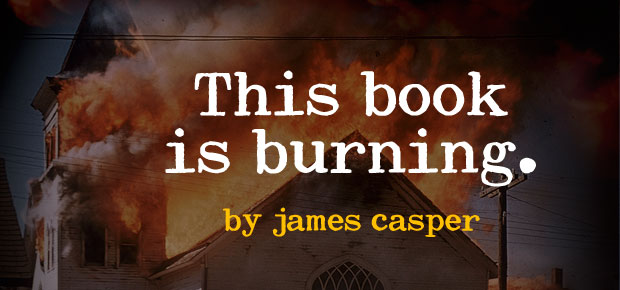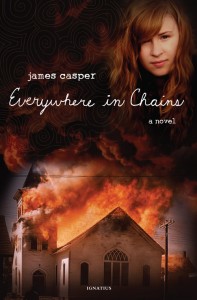
In the current not-so-civil war between conservative and liberal Catholicism, there will be no winners. Like World War One, it is a gruesome conflict of carnage and attrition. Casualties mount all around, and also in a middle ground staked out by novels like Everywhere in Chains.
In the middle ground, you never know who may have wounded you. The center is often seen as a refuge for weaklings, those washing their hands to let the mob decide between Christ and Barabbas. Often enough, though, it is no place for cowards.
If you doubt this, ask Pope Francis or Pope Benedict. Or try to break up a bar fight; or be a soldier lost in the fog of war; or play the game of Monkey in the Middle parish priests know so very well. Ask a novelist attempting to say, Everybody is wrong!
Or maybe ask Christ what he meant when he said, “Blessed are the peacemakers, for they shall be called the children of God.”
 Christ remains to this day the ultimate guy in the middle, and the Sermon on the Mount—if anyone bothers to think about it—is all about taking the middle ground. He also occupied the middle cross when the end came. At times, the middle is where the action is, because you might be killed there.
Christ remains to this day the ultimate guy in the middle, and the Sermon on the Mount—if anyone bothers to think about it—is all about taking the middle ground. He also occupied the middle cross when the end came. At times, the middle is where the action is, because you might be killed there.
It turns out that even Dante got this wrong: Hell with all its certainties must be a boring place, and yet most of his readers are attracted to reading it before Purgatory and Heaven. This is also why Middle Earth is so appealing that few Tolkien fans want to leave it. Anything can happen there, as Tolkien learned to his dismay when Lord of the Rings became the lovechild of hippies, New Age crystal-gazers, touchy-feelers, and Vietnam War protesters lighting fires in the streets.
Tolkien himself is known to have grumbled about strange changes wrought by Vatican II: that no one could possibly know what the early Church was all about so long ago, and so how could its leaders claim to be going back to it? As a medievalist, along with C. S. Lewis, he knew that the Middle Ages were as close as we could get. We know more about what the Romans ate for lunch than we will ever know about Christian religious practices way back then.
We know why Rome burnt as Nero fiddled, but much less why churches burn while bishops fiddle.
Everywhere in Chains attempts to answer that. “Churches need a good fire now and then,” says Father Luke Ulrich, a character stationed between Penelope, a brave young woman searching for her imprisoned father, and a cowardly bishop demanding silence.
“What would Christ have done?”
An answer arrives when Father Ulrich in tears apologizes to Penelope for a fellow priest, and a flawed church in a broken world. Nobody ever won a medal for apologizing, but often enough in stories of attrition, no one else is left. And so, when it is all over …
Ignatius Press sent me a letter this past December 7, in effect thanking me for a service rendered while announcing that my novel will be allowed to go out of print.
There are still a few copies around somewhere. As they say in the sales world, Get one while it’s hot! Baby, this book is burning.






CCharlotte Bloebaum
October 6, 2018 at 10:26 pm
I do not need to read this book to see that the CChurch has become more about the institution than actually following Jesus. The duvide is just like the political divude, the institution must be preserved at all times. Politics are destroying all the good traditional government ubstitutions and robbing our rights daily and in hith women have no voice. Disgusting.